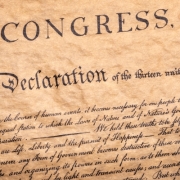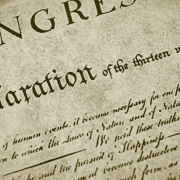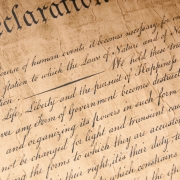The first chapter of America’s Revolutionary Mind, the 2019 book by C. Bradley Thompson, is an impressive survey of the Enlightenment scholarship that guided America’s Founders. Its concrete manifestation is the Declaration of Independence, “the existential embodiment of the Enlightenment’s highest ideals.” Because Thomas Jefferson’s marvelous document is built on a reasoned, conceptual structure, so is Chapter 1, as Thompson explains,
The core ideas that grew out of the Enlightenment launched by Bacon, Newton, and Locke can be summed up in three words: nature, reason, and rights.
This intellectual breakthrough cannot be overestimated. John Locke, and in his footsteps, John Adams and America’s other courageous political philosophers, were doing something that had never been imagined. They integrated the metaphysical world, human consciousness, and moral behavior into an unassailable socioeconomic system. One that maximizes human vigor, because,
The universality and timelessness of nature’s laws could be discovered through proper reasoning. That method, wrote Locke in the Essay Concerning Human Understanding, challenged men as rational creatures to employ those faculties.
Thompson continues by writing that “Bacon’s method proceeded by examining experience. Nothing could be accounted as real in nature that was not as observed fact or relation among facts. Knowledge and objective truth were open to all men.” This is also a radical assertion. It not only gives us a basic framework for critical thinking, it proclaims that every conscious human being with an active mind is not only a font of knowledge and productivity, but as a secondary benefit, a contributor to a society’s well-being.
Knowledge was no longer the monopoly of priests and potentates with political power. The only requirement for truth was to reduce abstract ideas, in a gradual process of inductive reasoning, to their self-evident concrete observations,
The new science viewed nature as an autonomous realm defined by the laws of identity, noncontradiction, and causality. Following Newton, enlightened thinkers saw the universe as an ordered machine that could be understood rationally.
In 21st century America, we are in the midst of a technological revolution that benefits everyone. This was made possible by 20th century entrepreneurs (Engelbart, Washington) and economists (Mises, Hazlitt, Simon, Sowell), and 19th century industrialists (Rockefeller, Tesla) and capitalists (Say, Bastiat, Douglass). We stand on the shoulders of these giants as James Madison and John Adams stood on the shoulders of John Locke, who in turn stood on Bacon’s and Newton’s,
In the same way, Locke attempted to grasp human nature and the operation of the mind. Locke assumed there are moral laws of nature to be discovered and revealed. The light of reason had opened men’s eyes to the rights of man.
Thompson summarizes the Enlightenment’s development of ethical thinking with, “More complex ideas of morality and law are put together from simple ones by the faculty of reason, that is, the mental functions of repetition, comparison, combination and abstraction. The goal of such knowledge was to guide man in determining what he ought to do as a rational and voluntary agent for the attainment of any end, especially happiness.”
This is another revolutionary achievement – determining what man ought to do is the elusive connection between the objective world of science – what is, and the previously subjective world of ethics. In Thompson’s words, the Enlightenment was “an era of philosophic and scientific thinking that provided a new way to see the world and man’s place in it.”
Locke’s epistemological goal was moral: in a world inundated with religious mysticism, his intention was to show that man’s rational faculties were in fact capable of discovering and knowing objective moral laws.
Brad Thompson summarized this theme in Chapter 1 by saying, “This moral code is as certain and absolute as mathematics and the Newtonian laws of nature. A demonstrative science of ethics was the Holy Grail of Enlightenment thinking. The great ambition of Enlightenment philosophers was to establish a demonstrative and secular science of ethics.”
Yet in 21st century America, despite the marvelous socio-economic achievements and the technological revolution made possible by Enlightenment political philosophy, the secular science of ethics is under assault under the guise of ‘social improvement.’ As postmodern philosopher Michel Foucault declares, “Freedom of conscience entails more dangers than authority and despotism.”
For the authoritarian wannabes whose goal is your submission to their government authority, the first step is to cancel Enlightenment thinking and demonize its amazing progress. That’s what we are experiencing today. Critical thinking has been replaced with floating concepts (food security, climate change, systemic racism, reimagined anything, diversity and inclusion) that are disconnected from context and reality. This has become the essential curriculum for progressive, government monopoly school systems.
As Foucault explains, “Knowledge is not for knowing: knowledge is for cutting.” That can mean whatever you like, because “I don’t feel that it is necessary to know exactly what I am. The main interest in life and work is to become someone else that you were not in the beginning.” This ambiguity is why our America’s Revolutionary Mind project is more necessary than ever,
Locke attempted to grasp human nature and the operation of the mind. Moral truths would be self-evidently true. He gives two examples: ‘Where there is no property, there is no injustice. No government allows absolute liberty.’
Thompson expands on the critical thinking process when he informs us that, “these propositions are logically necessary based on the relationship of the key terms to one another, Locke opened a new moral vista for the Western world with this radical first premise: men are morally self-owning, which means they are fully sovereign over their own lives. Locke is the first political philosopher in history to make the individual the primary unit of moral and political value.”
To help reinforce and sustain yourself as the primary unit of moral and political value, aka an American, please feel free to join us on Facebook at Waking America’s Revolutionary Mind.













